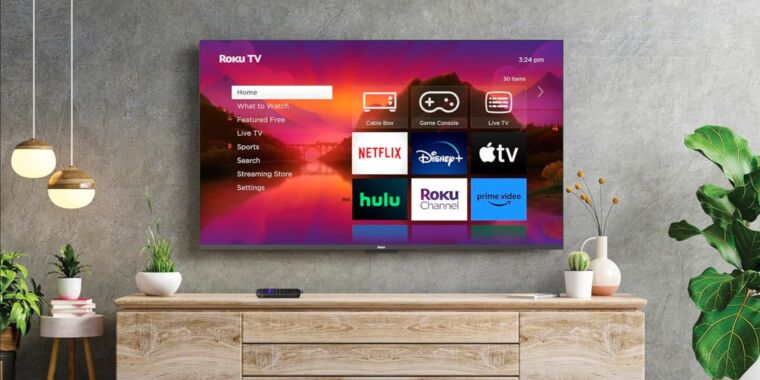- cross-posted to:
- [email protected]
- cross-posted to:
- [email protected]
A patent application from the company spotted by Lowpass describes a system for displaying ads over any device connected over HDMI, a list that could include cable boxes, game consoles, DVD or Blu-ray players, PCs, or even other video streaming devices. Roku filed for the patent in August 2023 and it was published in November 2023, though it hasn’t yet been granted.
The technology described would detect whether content was paused in multiple ways—if the video being displayed is static, if there’s no audio being played, if a pause symbol is shown anywhere on screen, or if (on a TV with HDMI-CEC enabled) a pause signal has been received from some passthrough remote control. The system would analyze the paused image and use metadata “to identify one or more objects” in the video frame, transmit that identification information to a network, and receive and display a “relevant ad” over top of whatever the paused content is.



Can’t we put these devices in some kind of dev mode and install software to stop this shit?
I assume these devices run some kind of Linux kernel, with a stripped down Linux distro.
The problem there is proprietary hardware blobs, no one’s made open-source drivers for any of the myriad TV manufacturers, each with their own OS.
How do emby or jellyfin devs develop clients on roku?
I would think, if you have that level of access, you could also stop or patch whatever OS services they run.
Surely you can ssh into these devices right?
The API for developing apps is absolutely open, but the OS isn’t. They’d give you some kind of development environment (like Android with Android studio), and a way to get logs out. The apps are often vetted by the platform like Android and iOS apps are, and they’d be able to override anything your app could do anyway.
So think consoles, phones, tablets, etc. The OS is locked down, but you can develop apps for it.
So probably no SSH access unless you find a backdoor or something. Your time is better spent buying something without that crap, like certain projectors, commercial displays, etc. They subsidize the cost of the TVs with that nonsense, so they’re going to prevent you from removing it.
roku generally puts a lot of effort into security
“security” for themselves, not the customer, I guess
i’m trying to say that they’re pretty locked down